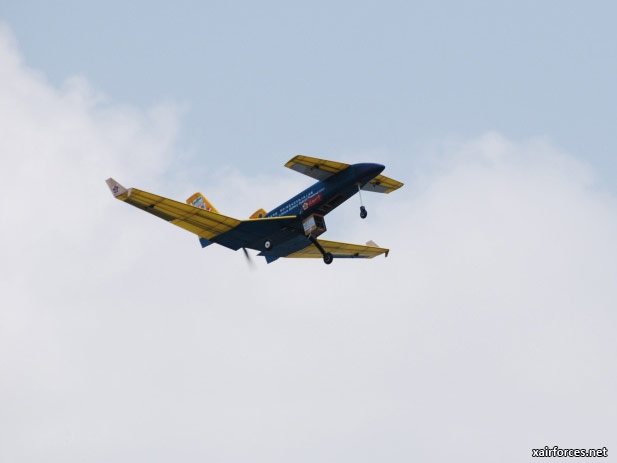
Taiwan to Fly Jet-Powered NCKU UAV

An unmanned aerial vehicle (UAV) design team led by Wei-Hsiang Lai, professor of aeronautics and astronautics and director of advanced propulsion and power system research center at National Cheng Kung University (NCKU) has innovated first turbo-jet robot aircraft named Sky Fortress-III anticipating to assist in typhoon surveillance and disaster prevention and marked a milestone in robotic aviation of Taiwan.
The critical role of turbines in aircraft is well-acknowledged and the global market of UVA is about NT$100 billion annually. The aeronautics and astronautics research team in NCKU will put effort in integrating fields of geomatics, water conservancy, civil engineering, environmental engineering, and earth sciences in UAV innovation to facilitate not only scientific research but civilian issues like surveillance and disaster prevention, said President Hwung-Hweng Hwung of NCKU.
Prof. Lai proudly initiated the debut, Sky Fortress-III remodeled from 2011 Taiwan UVA Design Competition champion Sky Fortress-II designed by NCKU UAV team and advanced from OS91 methanol engine to King Tech K80, a turbojet engine.
It weighs 7.5kg with wind span in 3m performing astonishingly in the primary run at a speed of above 200km/h and expecting to reach 300km/h when the structure is further fortified.
To build a small, strong propeller driven aircraft like Sky Fortress-III, the miniaturization of the turbojet engine is the key innovation. The NCKU UAV design team with more-than-10-year experience has successfully applied the turbojet engine to the unmanned aircraft.
The engine assembled in Sky Fortress-III, King Tech K80, is a product cooperatively innovated by professor Lai and Taiwan-based KingTech-Jet Co., Ltd., with its propelled power 8kg thrust and powered with diesel or JP-8 jet fuel is favored by UAV players around the world.
Source: TAINAN, Taiwan - 01 March 2012 - National Cheng Kung University News
Photo: NCKU Fuel Cell and Lithium Battery Hybrid Powered Unmanned Aerial Vehicle Takes Off Successfully in Pingtung, Taiwan (Photo by research.ncku.edu.tw)
(2.03.2012)
|